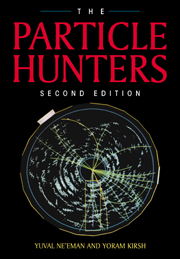Book contents
- Frontmatter
- Contents
- Preface to the first edition
- Preface to the second edition
- 1 The building blocks of the atom
- 2 Physical laws for small particles
- 3 The discoveries of the 1930s and 1940s
- 4 Particle accelerators — or from hunters to farmers
- 5 Strange particles
- 6 Basic forces and the classification of particles
- 7 Conservation laws
- 8 Short-lived particles
- 9 To the quarks — via the eightfold way
- 10 More quarks — or charm, truth and beauty
- 11 The Standard Model and beyond
- Appendix 1 Properties of semi-stable particles
- Appendix 2 The Greek alphabet
- Name index
- Subject index
7 - Conservation laws
Published online by Cambridge University Press: 05 August 2012
- Frontmatter
- Contents
- Preface to the first edition
- Preface to the second edition
- 1 The building blocks of the atom
- 2 Physical laws for small particles
- 3 The discoveries of the 1930s and 1940s
- 4 Particle accelerators — or from hunters to farmers
- 5 Strange particles
- 6 Basic forces and the classification of particles
- 7 Conservation laws
- 8 Short-lived particles
- 9 To the quarks — via the eightfold way
- 10 More quarks — or charm, truth and beauty
- 11 The Standard Model and beyond
- Appendix 1 Properties of semi-stable particles
- Appendix 2 The Greek alphabet
- Name index
- Subject index
Summary
Conservation laws and symmetries
What are the laws which rule our particle jungle? Is it possible to comprehend why one particle or another decays in a given manner, or to predict the results of a collision between two particles? The developers of quantum mechanics showed us the basic path which we must take: wave functions, wave equations, and so on. But the theory is incomplete, as we have no a-priori knowledge of the interparticle forces. Moreover, even when these forces become known, we often find that the calculations, in practice, are too complicated.
A number of simple laws, known as ‘conservation laws’, provide us with great assistance in both these concerns. Each law of this kind states that a certain physical quantity cannot change during the course of reactions between particles. The quantity remaining after the reaction must be identical to the quantity present beforehand. We can illustrate this with examples from the field of economics. In a country in which money is printed only at the rate at which it is taken out of circulation the general amount of money in circulation remains fixed. An industrial firm whose incomes exactly equal its expenditures maintains constant internal capital.
The physicists who dealt with classical physics (the physical theories prior to the appearance of relativity and quantum mechanics) were aware of a number of conservation laws, derived from decades of experimentation.
- Type
- Chapter
- Information
- The Particle Hunters , pp. 133 - 179Publisher: Cambridge University PressPrint publication year: 1996



